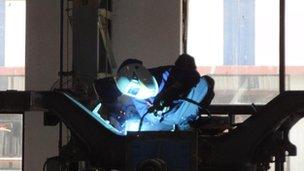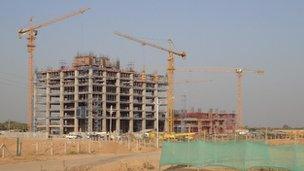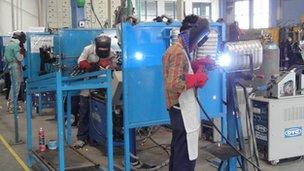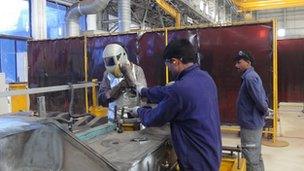Gujarat state in the fast lane of Indian economy
- Published

Gujarat is continuing to attract more overseas train and car companies
The Indian state of Gujarat doesn't have a metro rail system, yet the biggest carriage-making factory in the country is located here.
As India looks to upgrade its public transport in cities like Delhi, Bangalore and Hyderabad, Bombardier Transportation sees big opportunities.
Its fleet of Movia carriages operates on the Delhi metro system, where it has a contract to make 614 of them in total.
And they are being made in Savli - just outside of Baroda in Gujarat.
Set-up at a cost of more than $41m (£26m), the railway vehicle manufacturing factory will not just cater to the Indian market but serve as a hub for exporting to South East Asia and Asia Pacific.
Benoit Cattin Martel, president of the company, says building the plant in Savli in 18 months was a world record for it.
"When we were taking the big decision for the metro project, we looked around and decided to be in Gujarat.
"In fact it's proven to be a very good choice because we have great support from Chief Minister Narendra Modi and his team."
Controversial politician
The head of Bombardier is not alone in his lavish praise for the state's chief minister.
Ratan Tata, the chairman of India's Tata Group, famously said in a public address in 2007: "It is stupid if you are not in Gujarat".
Many top leaders from Indian industry have even suggested that Mr Modi could be a likely candidate for prime minister in 2014, when the next general election is expected.
Yet while some credit the controversial chief minister for Gujarat's success, others call him a divisive force.
Months after he became chief minister in 2002, the state erupted in violent Hindu-Muslim riots that killed more than 1,000 people.
It was one of India's worst outbreaks of religious violence.
But 10 years on, whilst the controversy is still being debated, it isn't stopping business from flowing in.
Most top Indian business houses are all invested here, and most commentators agree that the state is growing faster than the rest of the country.
'Worker friendly'
But Mr Modi's prize catch is located at Sanand, an hour outside Ahmedabad - the Tata Motors' Nano car project.

New developments are springing up across the state
In 2008, the Gujarat government welcomed the investment after political unrest forced the Tatas to leave the Communist-ruled state of West Bengal.
The speed at which the entire investment moved across from the east to the west of India is a story that every businessman here narrates.
Udayan Banerjee is the managing director of Sharda Motor Industries - one of the first Tata vendors to relocate.
He says at the event to inaugurate the Nano plant that Mr Modi said the cost of bringing the huge investment to Gujarat was just one rupee (less than five cents).
This was in reference to the cost of one text message that Mr Modi sent to the Tatas saying "Welcome to Gujarat". That did the trick.
Now the Nano plant and around 60 car parts suppliers have moved here to Sanand.
Sharada Motor Industries makes 20 components for the Nano, and Mr Banerjee says businesses will move wherever they are welcomed.
"The environment here is very worker friendly. More importantly there is business.
"That's why we have all come over here. We don't have hassle for infrastructure and no hassle in getting any sanction passed by the government."
Car hub
The Tatas are not alone. Gujarat is fast emerging as the new car centre of India.

Sharada Motor Industries makes parts for Tata's Nano vehicle
Maruti-Suzuki, Peugeot, Ford and General Motors are looking to set-up plants here.
That will create the capacity to make an additional three million cars per annum, starting 2014, which means one out of every three cars sold in India will come from Gujarat.
Ford has announced that it is investing nearly $1bn in building a new vehicle manufacturing and engine plant in the state.
French carmaker Peugeot also has started setting up a plant in Sanand.
Other than the pro-business environment, carmakers say the advantage in Gujarat is its easy access to ports which reduces freight costs.
No power cuts
But the biggest reason for Gujarat's popularity is that unlike most of India it is a power-surplus state.
Mr Banerjee says: "We don't need a captive generator to run our plant here. This is the only plant I have out of the 17 plants in seven states in India that doesn't need a backup generator."
Other than coal-based thermal power plants, the state leads the country in solar energy usage.
The Asian Development Bank recently approved a $100m loan to Gujarat to build a 500 megawatt solar park.
Apart from energy, infrastructure in the state is also on the fast track.

Gujarat has a reputation for being very business friendly
Roads are being widened and upgraded. The city of Ahmedabad has a successful Bus Rapid Transit System and is soon getting a metro rail project.
The state is the biggest benefactor in the proposed Delhi-Mumbai Industrial Corridor. Nearly 40% of this corridor passes through Gujarat.
New airports and ports are being planned.
Gujarat already has 41 ports that handle 80% of India's traffic and 20% of its cargo. The state is promoting at least four private ports - Mundra, Pipapav, Kandla and Dholera.
Everything is geared towards one thing - and that's to attract more business here.
Benoot Cattin Martel, president of Bombardier says it's effective.
"What it [Gujarat] is doing right is to treat industry with priority," he says.
"They walk the talk - that means all commitment made by Gujarat has been served to the industry.
Industry is very dependent on capacity to produce on time and quality. So this is definitely the right environment for us."
'Business acumen'
But is the state's economic success because of the politician in power or is it the people of the state?
Ordinary Gujaratis too say they have moved on, such as Ravin Vyas, 42, and his family.
Running a chemical business, he says it's the spirit of the people here that drives the state.
"Businessmen are respected here. We move on - political incidents, natural calamities happen everywhere. They don't deter us.
"The business acumen is ingrained in the culture here. That's what the culture of Gujarat is!"
But 10 years on, have people really forgotten the terrible violence of 2002?
Not really. But people are quick to point out that it hasn't stopped its economic triumph.
Whether it's because of the government or it's the people, the state is attracting more investment than the rest of the country.
Now it's up to the rest of India to see if there are lessons for them to learn from Gujarat's economic strides.
Shilpa Kannan reports on why the western Indian state of Gujarat has become such an attractive place for transport manufacturing.